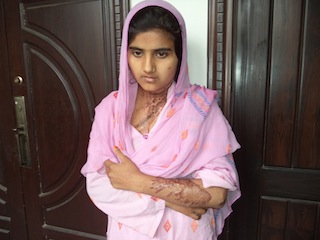The long road to justice for Pakistan's acid attack survivors

Maryam Abid, 14, from Multan, a district of Punjab, sat on a sofa at the Acid Survivors Foundation (ASF) Pakistan office in Islamabad. “My life was going smooth and everything was normal,” she said. “But in July 2015 my life took an ugly turn when some unknown men scaled the wall of our house at midnight and threw acid on [myself, my brother, sister, and father].”
“We were sleeping in the courtyard of our home when monsters entered and sprinkled acid on us and changed our lives forever,” she said. “I felt someone throw [what felt like] hot water on me. My neck and hand were burning extremely.” She fell unconscious and woke up in a hospital bed. “The incident has devastated my life and disfigured me,” she said. Her family members don’t know who attacked them, but they suspect that they were targeted by a man who wanted to marry Maryam. They have filed a complaint with the local police, but so far no suspects have been identified.
“I was engaged to my cousin and was about to get married after Ramazaan of last year, but the incident snatched all happiness from me,” she said. “Now my fiancé refused to marry me because of my acid burns.”
Acid attacks targeting women are a “worldwide phenomenon,” according to Acid Survivors Trust International, an NGO working against acid violence. But Pakistan is one of the half dozen countries where attacks are most prevalent.
In 2011 Pakistan passed the Acid Control and Acid Crime Prevention Bill, which established 14 years to lifetime imprisonment and fines up to 1 million rupees for perpetrators. The law seems to be having an impact—ASF Pakistan reports that conviction rates rose from 6 percent before the law was passed to 18 percent in 2012. But the incidence of acid attacks in the country remains high, and it can still be difficult for survivors to find justice and recover from the assaults.
According to the ASF, an NGO that works to eradicate acid violence and promote human rights of survivors, approximately 200 acid attacks take place annually in Pakistan, and the victims are overwhelmingly women. Muhammad Khan, executive director of ASF Pakistan, said that from 2007 to March 2016, about 1,500 cases of acid assaults were registered with the group.
Khan said motives behind the attacks include rejection of a marriage proposal, jealousy, personal enmity, conflicts related to dowry, divorce, and wives’ refusal to allow their husbands to marry a second wife. “Besides physical health issues,” he said, “all acid survivors face psychological distress, depression, self-esteem problems, and nightmares.” Treatment of acid violence is expensive, costing thousands of rupees depending upon the nature of the burns. Sometimes survivors need to undergo many surgeries. Khan pointed out that acid attacks cause disfigurement, loss of eyesight, and damage to skin, lips, eyelids, and nostrils. “It is the worst form of terrorism,” he said.
A number of organizations, including Aurat Foundation and the Human Rights Commission of Pakistan, continue to work to raise awareness and provide help for survivors. Da Hawa Lur, an organization in Peshawar, in Khyber Pakhtunkhwa province, working to combat violence against women, provides legal aid to survivors. Khursheed Bano, chief executive officer of Da Hawa Lur, said that before the passage of the Acid Control law, few survivors brought charges “because of the fear of repercussions, intimidation, pressure on survivors' families for compromise, and out-of-court settlement of cases.” Although some still fear threats by perpetrators and their families, Bano has seen greater numbers of survivors filing reports with police.
Bano, along with other advocates, has called for more legislative action in the form of a ban on or regulation of the sale of acid.
Another acid survivor from Lahore, a 19-year-old woman who wished not to be named, said: “A boy who wanted to marry me threw acid on me on January 5, 2016. I was going to university when this wicked boy on a bike intercepted me and asked me to go with him to a deserted place. I refused, upon which he flew into a fit of rage and put some liquid on his hand and then rubbed it on my face before saying, ‘If you do not belong to me, I’ll not let you to belong to anyone else.’”
“The appalling incident shattered my life into a million pieces and broke my dreams,” she said.
“I stopped going to university.” She added, “I will join the university again and face the world once my treatment completed.”
After she reported the incident to the police, an arrest was made, and the case is pending.
Naila Farhat, 26, from Layyah district, said, “I was only 13 and in grade 8 when a man who wished to marry me threw acid on me.”
“The acid ate away my face skin, devastated my life, and changed it forever, but I must say that life doesn’t stop here,” she said. “We have to live for our family, for those who care for us and love us. … After that painful incident, it took a long time for me to live a normal life, face people, and put smile on my face.”
Farhat underwent 20 surgeries and a hair transplant. Eventually, her attacker was sentenced to 12 years in prison and fined 1.2 million rupees. “It took me six years to win a legal battle,” she said, “but those six years were like six decades for me and my family.” She said that her family had to sell their home to pay for legal costs and her medical expenses.
Acid attack survivors suffer for years both psychologically and physically. Even with an improved chance of conviction, the legal process is lengthy and expensive, multiplying miseries for survivors and their families.
More articles by Category: Disability, International, Violence against women, WMC Loreen Arbus Journalism Program
More articles by Tag:



























